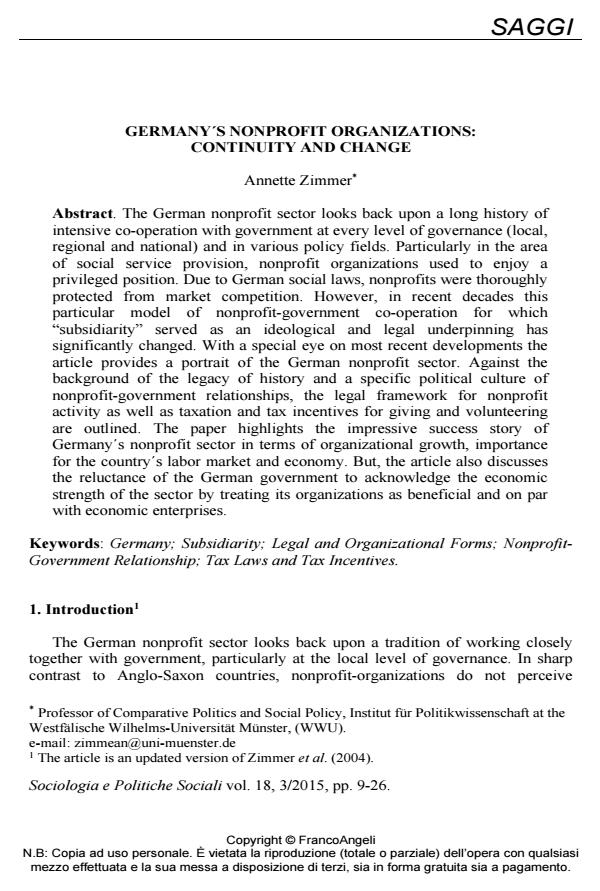Germany´s nonprofit organizations: continuity and change
Titolo Rivista SOCIOLOGIA E POLITICHE SOCIALI
Autori/Curatori Annette Zimmer
Anno di pubblicazione 2016 Fascicolo 2015/3
Lingua Inglese Numero pagine 18 P. 9-26 Dimensione file 111 KB
DOI 10.3280/SP2015-003002
Il DOI è il codice a barre della proprietà intellettuale: per saperne di più
clicca qui
Qui sotto puoi vedere in anteprima la prima pagina di questo articolo.
Se questo articolo ti interessa, lo puoi acquistare (e scaricare in formato pdf) seguendo le facili indicazioni per acquistare il download credit. Acquista Download Credits per scaricare questo Articolo in formato PDF

FrancoAngeli è membro della Publishers International Linking Association, Inc (PILA)associazione indipendente e non profit per facilitare (attraverso i servizi tecnologici implementati da CrossRef.org) l’accesso degli studiosi ai contenuti digitali nelle pubblicazioni professionali e scientifiche
The German nonprofit sector looks back upon a long history of intensive co-operation with government at every level of governance (local, regional and national) and in various policy fields. Particularly in the area of social service provision, nonprofit organizations used to enjoy a privileged position. Due to German social laws, nonprofits were thoroughly protected from market competition. However, in recent decades this particular model of nonprofit-government co-operation for which "subsidiarity" served as an ideological and legal underpinning has significantly changed. With a special eye on most recent developments the article provides a portrait of the German nonprofit sector. Against the background of the legacy of history and a specific political culture of nonprofit-government relationships, the legal framework for nonprofit activity as well as taxation and tax incentives for giving and volunteering are outlined. The paper highlights the impressive success story of Germany´s nonprofit sector in terms of organizational growth, importance for the country´s labor market and economy. But, the article also discusses the reluctance of the German government to acknowledge the economic strength of the sector by treating its organizations as beneficial and on par with economic enterprises.
Parole chiave:Germany; Subsidiarity; Legal and Organizational Forms; Nonprofit- Government Relationship; Tax Laws and Tax Incentives
- Zivilgesellschaft und Wohlfahrtsstaat im Wandel Katharina Obuch, Christina Grabbe, pp.143 (ISBN:978-3-658-16998-5)
- Challenges to Nonprofit Organization Participation in Social and Development Policy Planning in South Africa Sokeibelemaye Nwauche, Shawn Teresa Flanigan, in Nonprofit Policy Forum /2022 pp.119
DOI: 10.1515/npf-2021-0049 - The Nonprofit Starvation Cycle: Empirical Evidence From a German Context Peter Schubert, Silke Boenigk, in Nonprofit and Voluntary Sector Quarterly /2019 pp.467
DOI: 10.1177/0899764018824669 - A Framework to Integrate Non-profits into Development Planning in South Africa Sokeibelemaye Nwauche, in VOLUNTAS: International Journal of Voluntary and Nonprofit Organizations /2023 pp.1134
DOI: 10.1007/s11266-022-00536-w
Annette Zimmer, Germany´s nonprofit organizations: continuity and change in "SOCIOLOGIA E POLITICHE SOCIALI" 3/2015, pp 9-26, DOI: 10.3280/SP2015-003002